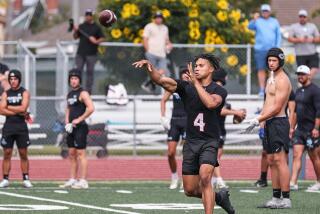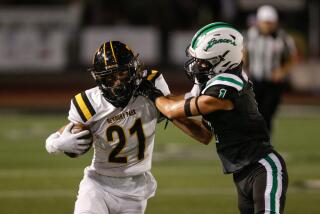Commentary : Penn Coach Accepts More Serious Challenge
Football is an insular sport and it’s not terribly difficult to develop an ivy-tower mentality at such a prestigious institution as the University of Pennsylvania. So much for stereotypes. To whatever degree they exist, they don’t apply to Ed Zubrow.
Zubrow recently resigned his position as head football coach at Penn. A man with two Ivy League championships to his credit in three years on the job, he wasn’t forced out by disgruntled alumni, boosters or a board of regents seeking greater recognition for the program. He didn’t leave for a more lucrative contract at a school where athletics surpasses academics on the list of priorities. He took a walk into the real world.
“Our campus was pretty much protected,” Zubrow said by telephone from Philadelphia where he has become the point man in the school district’s efforts to combat drug abuse and dropouts. “But if you open your eyes at all, you know there’s a problem that’s spreading.”
And, at 38, with a real future in the football business, Zubrow decided he wanted to do something to curb that problem. “Many coaches have had a great deal of influence on me as an educator,” he said. “What happened to me this fall is that I wanted to be involved in other challenges. This is the challenge now.”
His background is one of privilege. He graduated from Haverford College on the Main Line with a degree in American studies. He served as athletic director and coach at a tony prep school, Penn Charter. He was the chief recruiter at Penn under the successful Jerry Berndt and succeeded the man when the latter left for Rice. Drugs were not something he encountered on a daily basis.
“We were pleased that we were able to attract kids from the inner cities to Pennsylvania,” Zubrow said. “But the clear scourge of drugs had affected their family lives, deeply in some cases. And, being located in West Philadelphia, the university was involved with problems outside its gates.”
Zubrow recalled stopping for coffee at a convenience store near the campus and seeing a homeless man outside each morning. It raised his consciousness about the victims of society. “I’ve been reflecting for some time on the issues of our time,” he said.
The search by Dr. Constance Clayton, superintendent of the nation’s fifth-largest school district, for an aide to deal with the drug peril and potential dropouts struck Zubrow as a tremendous opportunity. “The real heroes now are the people on the front line,” he decided. “Teachers, ministers, police.” Not that Zubrow expects to be a hero in his new post. He just wants to do what he can before the disease reaches epidemic proportions. The man is married but childless, yet he fears for children growing up in his hometown.
Football can wait. How long even he isn’t sure. “I was never one to have a long-range game plan,” he said. “I never even thought about being a head coach. I’d just make a decision to continue coaching each year.”
P.J. Carlesimo, whose Seton Hall team will oppose Duke in the NCAA championship semifinals on Saturday, attended high school at Scranton (Pa.) Prep. According to reports, Prep Coach Jack Gallagher was the model for the central character in “That Championship Season,” the successful Broadway play and motion picture written by Jason Miller.
“Prep people all say it was based on (Steve) Vacendak’s junior year,” Carlesimo said. Vacendak later became a starter on the Duke team that was ranked second in the nation and reached the Final Four in 1966. “Of course,” Carlesimo added, “people at West Side St. Pat’s say otherwise. Miller went to St. Pat’s. I asked (Miller) once and he wouldn’t say.”
Although San Diego Padres manager Jack McKeon isn’t an alumnus of Seton Hall, he did attend classes there before receiving his degree from Elon (N.C.) College. He didn’t play basketball for the Pirates because he already had signed a professional baseball contract, and in those days pros and amateurs didn’t mix.
But, at 5-9, McKeon was the leading rebounder on a state championship club at St. Mary’s in South Amboy, N.J. Among his teammates were Johnny and Eddie O’Brien, twin dynamos who starred at Seattle University before becoming infielders with the Pittsburgh Pirates. McKeon said he survived under the basket in St. Mary’s 2-1-2 zone by clutching the shirts or shorts of much taller opponents.
It came as no surprise to McKeon that Johnny O’Brien, also 5-9, was the first player to score more than 1,000 points in a college season and held NCAA records for most points, field goals and free throws in a career at the time of his graduation in 1953. “In high school,” Trader Jack recalled, “I’d get the rebound, dribble it to half court, give it to Johnny and that was it. We called him ‘Shots.’ ”
More to Read
Go beyond the scoreboard
Get the latest on L.A.'s teams in the daily Sports Report newsletter.
You may occasionally receive promotional content from the Los Angeles Times.










